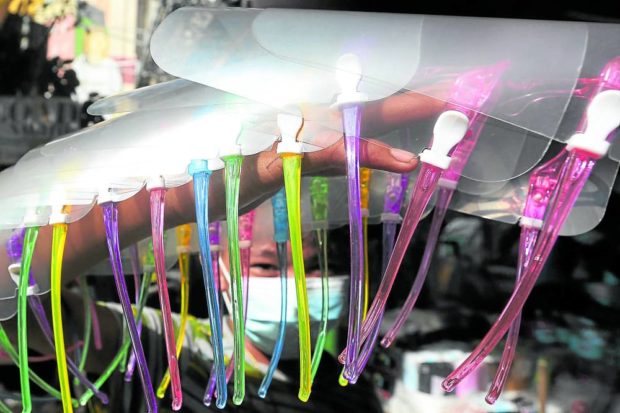No need to reimpose face shield policy yet despite Omicron threat, says DOH

FACE UP This young vendor in Pasay City may need to think of a new ware to sell since the government lifted the requirement on face shields in areas under alerts level 3, 2 and 1. —MARIANNE BERMUDEZ
MANILA, Philippines — There is no need yet to re-impose the mandatory use of face shields at the moment as the transmission level of COVID-19 in the country remains “very low” despite the threat of the Omicron variant, an official of the Department of Health (DOH) said Tuesday.
Dr. Alethea De Guzman, director of the DOH epidemiology bureau, made the remark as proposals on the re-imposition of the face shield policy surfaced anew amid the threat of the new coronavirus variant.
“As transmission goes down, we really need to open sectors, but also in a safe manner. Right now, the (face) mask will be able to provide us that benefit or protection,” De Guzman said in an interview with ABS-CBN News Channel.
“’Yung paggamit siguro na i-mandate na naman ang face shield, we’re actually leaving that to private establishments… But right now, there is no need at this very low transmission level na idagdag natin yung face shield,” she added.
(We leave it to private establishments when it comes to mandating face shields… but right now, there is no need to add face shield at this very low transmission level.)
Article continues after this advertisementCurrently, wearing of face masks is voluntary in areas under Alert Level 2, such as Metro Manila. Private establishments and workplaces, however, may require their customers and workers to wear face shields.
Article continues after this advertisementInterior Secretary Eduardo Año on Monday night said the face shield policy will be implemented again once the Omicron variant of COVID-19 enters the Philippines and higher alert levels are imposed in affected areas.
The World Health Organization (WHO) has said that the Omicron variant is likely to spread internationally, posing a “very high” global risk where COVID-19 surges could have “severe consequences” in some areas.
“Omicron has an unprecedented number of spike mutations, some of which are concerning for their potential impact on the trajectory of the pandemic,” the WHO said.